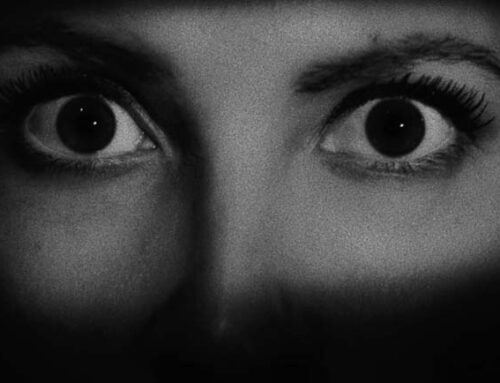Screening at the 2021 Tribeca Film Festival within its Narrative Feature category, No Man of God is a new Ted Bundy film that attempts to dive ever deeper into the mind of someone thought to be one of the most intelligent murderers of the modern era. Though new Ted Bundy narrative and documentary films seem to occur almost on an annual basis at this rate, I do appreciate this latest project’s method of taking a step back from doing an up-close narrative focused on Bundy, and instead, taking a wider view of his life to include the persons around him in his last years before his execution. Directed by Amber Sealey and written by Kit Lesser, No Man of God is one of the better Ted Bundy movies in my humble opinion, oozing with an uncanny amount of authenticity.
Elijah Wood stars as Bill Hagmaier, a newly inducted FBI agent who specializes in the psychology and profiling of serial killers, and as a result, volunteers for an assignment to interview noted murderer Ted Bundy. Meeting Bundy at his Florida correctional facility during the 1980s, Hagmaier is tasked with forming a connection with Bundy in order to get him to finally confess to all of his crimes. Under the guise of doing research for the FBI’s profiling methodology, Hagmaire gets Bundy to open up to him about his personal life as well as insight into being a serial killer. After years of research, the two realize they have gotten inside of each others’ heads, perhaps to a dangerous extent, but their friendship is put to the test when Bundy is handed his final sentence and forced to confront the reality of meeting god.
There are no other actors that I can immediately think of who can perform both the innocent straight man as well as the unexpectedly sinister character in the same movie better than Elijah Wood (see also his other darker roles in Maniac, his small but memorable bit in Sin City, and even Come to Daddy). His angelic face was perfect for portraying the righteousness of a federal investigator, and his acting abilities also perfectly portrayed the moral crisis experienced by someone descending into the dark side of human behavior. Wood played opposite Luke Kirby’s Ted Bundy, with Kirby giving one of the most authentic portrayals of the nearly mythical murderer, humanizing him without sympathizing with him, and perfectly capturing Ted Bundy’s dark, methodical mind and thought processes in his eerily calm and measured tone.
Despite the movie being set primarily in the dimly lit Hagmaier-Bundy meeting room, No Man of God never feels claustrophobic or confined — this is a testament to the acting performances of the full cast, which filled each scene with tension and emotion from their warring intentions, as well as a testament to the great direction and cinematography of the film, which made effective use of wide framing and tracking shots that close-in to its subjects, like Bundy’s inevitable judgment day is closing in. What seemed like actual newsreels and commercials from the 1980s were also used quite frequently in the film to ground the setting in that time period, and though they were slightly distracting as transition shots, these were entertaining nonetheless and a reflection of director Amber Sealey’s creative directorial style. Overall though, I felt like No Man of Good was missing something; though it tried very hard to weed out the fluff and speculation often told about Bundy, it still felt as though the movie could have built up a more sinister atmosphere or dove deeper inside Bundy’s mind — this movie was primarily based on Bill Hagmaier, and as such, both characters seem under-explored having to share screentime, and furthermore, the horrific nature of Bundy’s crimes were slightly underdeveloped as I do not recall seeing any crime scene photos or even flashbacks of murders beyond verbal descriptions.
Psychology, true crime, and general Ted Bundy enthusiasts should find this narrative feature entertaining, though there is probably already all that there is to know about Ted Bundy without resurrecting him or his unfortunate victims. I question whether the film’s title is directed at Ted Bundy or Agent Hagmaier — No Man of God sounds cool and all, however, Ted Bundy never claimed to be a man of god, that is, a practicing Methodist, and further based on his murderous actions, it goes without saying that he was never a man of god. Agent Hagmaier, while a self-proclaimed man of god, begins to have ungodly thoughts, casting doubt on his innocence. Talks about religion seem rather shoe-horned toward the end of this film, which for the majority of its runtime plays out as a very slow-burning psychological thriller; though everyone knows how the story ends, Sealy manages to end this movie rather poignantly, fading out with an emotionally charged puff of smoke that shows the braying masses of the public court of opinion in the same murderous light as the film’s central figure.
MOVIE RATING — 7 out of 10
| No Man of God | ||
| RATING: | NR | No Trailer Available |
| Runtime: | 1 Hr. 40 Mins. | |
| Directed By: |
Amber Sealey
|
|
| Written By: |
Kit Lesser
|
|







